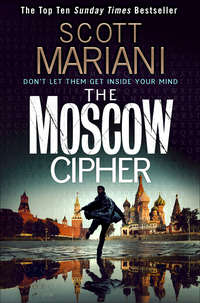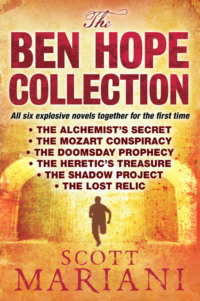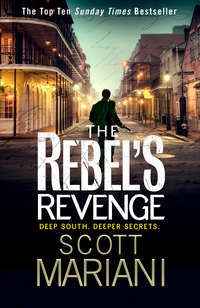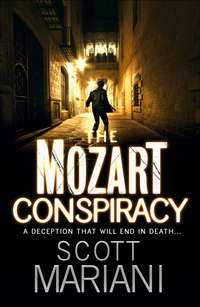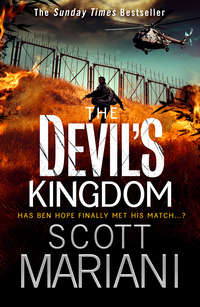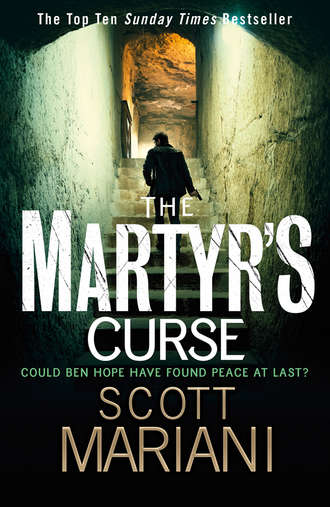
Полная версия
The Martyr’s Curse
His stomach felt queasy and his blood alcohol level was probably still too high for him to be driving. He swigged down an extra-large emergency dose of Père Antoine’s tonic en route, thinking it might somehow purge the toxins from his system, or at least help clear his head. It did neither, but was a small comfort to him nonetheless. The greater comfort was knowing he’d be home soon.
Home. It really was beginning to feel like that to him. Secure, closeted. A safe zone. He yearned to be there.
He drove doggedly on. The mountain road lifted him up and up, until the pine forests were far below and he could taste the pure mountain air that whistled in through his window. The closer he got to the monastery, the more the darkness in his mind seemed to lift. When at last the walls came into view, he felt a surge of optimism.
But as he neared the gates, he sensed something that unsettled him. Because the gates were normally shut, and now they were open. Maybe the monks had been anxious about his return after all, and had left them open as a gentle hint to God to speed him safely home. Or because everyone was at prayer. Or maybe not. It wasn’t that. There was something wrong.
Then he got closer to the gates and he saw what was wrong. The gates themselves, for a start. They’d been built to open outwards, but now they were hanging open inwards. Ben saw shattered wood. Buckled hinges. One of the gates was listing at an angle where its mountings had been ripped from the stone pillar.
Ben stopped the truck. He stared at the smashed entrance. Something had happened here while he’d been away. Something significant and irreversible and not good.
Those gates had withstood centuries of weathering. The steel-banded oak was eight inches thick, age-hardened, tough as slabs of slate and locked from the inside by an iron deadbolt you could have hung a battleship from. To smash them open would require an immense force. An extremely violent impact from a very heavy object moving at quite some speed. Like a seriously large and powerful battering ram.
Ben drove through the broken gates and rolled the Belphégor inside the yard. Then he stopped again.
And stared.
Chapter Twelve
He stopped, because of what he saw in front of him.
The crow that had been pecking at the body spread its wings and flapped away. There was blood on the pale cloth of the monk’s robe. Blood spread across the ground underneath him. He was sprawled face down in the dirt with his arms out to his sides and one leg crooked, as if he’d been trying to crawl forward on hands and knees before his limbs had given way under him.
Ben’s stomach clenched like a fist and he shut off the truck engine, ripped the key from the ignition and booted open the door and jumped down from the cab. His first illogical thought was that the monk had suffered a heart attack or a stroke. He ran towards the body, then abruptly halted a few yards short of it. He looked around him, and blinked, and his stomach clenched even more tightly when he saw that there were other bodies in the yard.
They were everywhere.
He could see five, six, seven of them from where he stood gaping in disbelief. Then an eighth, spread-eagled face-up in the shadow of the store building. Then a ninth, hanging out of the low arch of the cloister wall as if trying to clamber through it. More blood. Blood all over the place. Spatters of it on the stonework. Pools and spots and trails of it on the ground, congealing and going dark and sticky in the morning sun. There was a hum of buzzing flies in the air, dark clouds of them swirling and hovering over and around the bodies.
Ben hurried towards the nearest body and felt something small and hard under the sole of his boot. Even through thick rubber, he could tell right away that the object wasn’t a stone. He crouched and picked it up. A dull brass cartridge case. Its circular base was concentrically stamped in small lettering WIN 9mm LUGER.
It might have been an incongruous sight here in Chartreuse de la Sainte Vierge de Pelvoux, but it was an extremely familiar one to Ben’s eyes. Standard nine-millimetre ammunition, the casing manufactured by the Winchester Repeating Arms Company under licence to Browning Arms of Morgan, Utah. A relatively diminutive cartridge, but famously effective. High-pressure, high-velocity, beloved of practically every military force on the planet since its invention in 1902, making it the world’s most popular combat handgun and submachine gun round. It also lent itself very well to being downloaded to subsonic velocity levels, eliminating the ear-splitting crack that a bullet makes when breaking the sound barrier, and allowing the report to be further subdued by a sound suppressor. In layman’s terms, it was easily silenced. Which made it a natural for any kind of covert work, or the kind of criminal operation where a lot of shots would have to be fired without drawing unwanted attention.
Ben turned the spent cartridge over in his fingers and sniffed at the blackened case mouth. The whiff of cordite told him it had been recently fired. No surprises.
And it was no surprise either to see plenty more of the cases lying about the ground. Random patterns and clusters of them all over the place, scattered little yellow sparkles catching the sunlight.
Ben tossed the case away and clenched his jaw and assessed what he was seeing. One gunman hadn’t done this: that much was fairly obvious to him. It was the work of a team. How many strong, Ben couldn’t say. To carry out an orchestrated attack of this scale, he’d have estimated the need for upward of six, maybe eight shooters. That left the question why. And that was a question he couldn’t even begin to answer.
He crouched by the body. The man’s white tonsured hair was matted with blood that was dried almost black. Where the crow had been pecking at the blood-soaked cloth of his robe, there was a bullet-hole between his shoulder blades. A trail of blood led back a few paces. He’d been shot in the back, probably while fleeing. He’d fallen on his face and then managed to crawl a little way before his killer had stepped up close and fired a second shot to the back of the head.
Ben reached out and grasped the monk’s shoulder to roll him over. His skin was cool. There was little point in checking for a pulse as the body was stiffened up like a board with the onset of rigor mortis. The point-blank headshot had exited the middle of the monk’s forehead, an exit wound big enough to drop a golf ball into. It had made a mess of his face, but Ben was able to recognise him. It was old Frère Robert, who’d helped him rebuild part of the frost-damaged outer wall in the wintertime. Ben had liked him. He’d liked them all.
He stood up and stepped across to another body, then another. Then a fourth, and a fifth. Same result. All dead, all cooling, all stiff, all shot with what looked like nine-millimetre expanding hollowpoints. Small entry hole, tapering out to a big exit hole. Very lethal, and very messy. And expertly executed. From the quantity of brass on the deck and the way that every victim had been double-tapped, one to the chest and one to the head, Ben could tell that the killers had been armed with pistols. They’d done their work the same way he had been taught to do it in the army: the first shot snapped off centre-of-mass to bring the target down, the second aimed more closely to finish the job. Brutal and effective. No quarter given, no survivors left behind.
The trail of death led him from the yard to the store building to the church. Everywhere he went, he kept finding more of them. There was Frère Patrice, slumped in a sitting position against the low wall of the little garden that surrounded the church, still wearing the support bandage on his twisted ankle, his walking stick on the ground next to him, blood spattered across the stonework from the through-and-through headshot that had taken away part of his skull. Then a few yards on there was the lay brother Olivier, who’d been on the work detail carrying up the beer from the cellar. Then there was Frère Gaspard, the greedy one. Shot in the belly and the throat, as if the killers had been starting to get bored by the time they got to him and were experimenting with variations.
Ben walked on. His head was spinning and he wanted to wake up from the nightmare.
It was beyond imagining. Who had done this? What had happened here?
Ben wasn’t a pathologist. But he’d seen a lot of death in his time. Enough to know that a human body loses approximately 1.5° centigrade per hour after death until it reaches the ambient temperature around it. The colder the environment, the faster the cooling. It was a pleasantly warm morning for the time of year, by Alpine standards, maybe eighteen degrees. Living human body temperature was nearly twenty degrees warmer, at thirty-seven point five. Which would mean a rough maximum of thirteen hours for the corpses’ temperature to drop to the same level as the air. Allowing for the lower temperature of the early morning and therefore a faster rate of cooling, probably less than that. Say, ten hours. But the bodies felt a little warmer than ambient temperature. They were still cooling, not yet stabilised. Without a thermometer it was impossible to gauge accurately, but Ben estimated that the attack had taken place about five hours ago. That gave plenty of time for rigor mortis to set in, which generally happened sometime after the first couple of hours.
Ben looked at his watch. It was coming on for 9.30 a.m. At an educated guess, the slaughter had happened around half past four in the morning. Just before dawn. A time when the monks had wrapped up their final night-time prayers and would be slowly returning to their cells to take some rest before the day began again.
I should have been here, he was thinking over and over.
If he hadn’t been delayed, he would have been. If he hadn’t been drinking himself stupid in some bar with a bunch of strangers. The truck would have been ready for him to collect and drive home. He’d have got back yesterday afternoon. He’d have been here, with his friends, when the attack happened. He might have been able to do something to stop this.
But he hadn’t. And there wasn’t a damn thing he could do to change that sorry fact.
He spent the next twenty minutes checking inside each and every one of the monks’ cells. Most were empty. Some weren’t. He found no survivors. Then he checked the Father Master of Novices’ quarters, and the prior’s. The two monks were nowhere to be found.
Until Ben moved on and ran to the church.
A thin white-haired body lay sprawled on the church steps. His robe had ridden up his legs as he’d fallen. The blood pool had trickled down three of the stone steps before it had begun to congeal.
Ben recognised him and said, ‘Oh, no.’
It was Père Jacques, the Father Master of Novices. The palm of one outflung hand blown through by a gunshot; the same shot that had hit him above the left eyebrow as he’d tried to shield himself from the bullet. The nine-millimetre round had exited the crown of his skull and made all the usual ugly ravages on its way out. Ben didn’t want to have to look too closely, but then something drew his eye and made him bend to scrutinise the gruesome mess in more detail.
Among all the blood, something appeared to be sticking out of the centre of the monk’s forehead. It took him a moment or two to understand what he was seeing; then he reached down and gently grasped the small foreign object between finger and thumb. It came away easily, because it was only lightly stuck to the skin by a crust of dried blood that had formed around it. It was just over an inch long, cylindrical, maybe quarter of an inch thick. It shone the same colour as the spent cartridge cases that littered the ground, but it was softer than brass between his fingertips, and weighed almost nothing.
It was a cigarette butt. A very particular and distinct type, a brand Ben had come across before. The shiny foil filter was emblazoned with a minuscule Russian imperial eagle, emblem of the Czars. The filter was pinched and crumpled from the pressure of stubbing it out. The smoked end was blackened, crushed and trailing bits of unburned tobacco soaked with blood. Ben flicked the thing away in disgust. It had left a small circular burn mark on the dead monk’s brow.
To shoot a defenceless man in the head was one thing. To stub your cigarette out on him when he was down, that was another. The ultimate insult added to the ultimate injury.
Bastards.
Ben made himself remain calm. He stepped around the blood and walked inside the open door of the church. The cool interior smelled of incense and death. The mosaic stone floor laid centuries ago by master masons was smeared with more blood.
There were thirteen bodies inside the church. Either they must have congregated in here when the shooting began or they’d still been at prayer when the attackers hit.
One of the bodies was Père Antoine’s.
The old prior was as dead as the rest. The final expression frozen on the octogenarian’s face was one of serene calm. He looked almost beatific. As if he’d met his end in the quiet certainty that he was going to meet his maker, that this life was just one small stage in the journey and there was nothing to fear in leaving it behind.
That didn’t make it any easier for Ben to deal with. He crouched over the prior for a long moment, remembering their conversations and their chess games and the old man’s kindness to him.
He said out loud, ‘I’m going to find who did this.’
Vengeance is mine, saith the Lord. Ben was pretty certain that would have been Père Antoine’s reply. Or words to that effect. He’d have counselled Ben to leave it be. To find within himself the strength to walk away and resist the growing urge that was firing up his veins and making his hands shake and his heart pound and his breathing heave with anger. To go with God, walk the path of peace. Or as Jesus had said, Love your enemies and pray for those who persecute you, so that you may be sons of your Father in heaven.
Ben wished he had that strength. He wasn’t the man Père Antoine had been. He wasn’t Jesus either. Not by a long shot. And the path of peace was no longer his to walk.
He stood up and left the church. Headed slowly back down the bloody steps. He made his way through the arch that led into the shady cloister and found three more bodies spread out on the stone floor.
Including one in particular who shouldn’t have been there at all.
Chapter Thirteen
The man was no monk, that was for sure. He was from the outside, but he was no ordinary outsider either. It seemed strange to see anyone here not clad in monastic garb, and even stranger to see a man in black combat trousers, black high-leg military boots, black multi-pocket tactical vest, black ski mask, shooters’ gloves and utility belt. Then again, under the circumstances, maybe not so strange.
The dead man had been packing some sort of semi-automatic pistol before someone had disarmed him and left him with an empty holster. Presumably, the same somebody who had shot him twice in the head with the same nine-millimetre ammunition that had been used to dispatch the other victims. The empty shell cases were lying nearby. His eyes were open and glazed in the holes of the ski mask.
Ben touched three fingers to the guy’s neck and held them there for a moment before he whipped off the ski mask and looked at his face. The guy was somewhere in his mid-thirties, white, dark-haired, not ugly, not handsome, not a memorable face, but one Ben wouldn’t be forgetting for a long time. It wasn’t a monk who’d shot him. Aside from the obvious reason why that couldn’t be the case, Ben could think of an even more compelling one. This guy had been alive much more recently than any of the monastery’s dead residents. He wasn’t quite warm to the touch, but he was in a considerably fresher state than they were. Ben grabbed the black-clad right arm and wagged it from side to side and up and down and then let it flop limply to the guy’s side. No sign of rigor mortis yet. The shoulder and elbow joints were loose and flexible. The blood on his face and all down the front of his combat vest was still wet, barely tacky. He’d been dead for well under two hours. Maybe even less than one.
Which told Ben two things. Firstly, unless something extremely bizarre had taken place involving two rival armed gangs happening to choose this spot for a shoot-out and managing to hit almost nobody except bystanders, this fellow had been killed by his own team. The precision of the gunshot wounds in his head made it impossible that he could have accidentally taken a stray bullet intended for one of the monks. This had been deliberate. Ben had absolutely no idea why.
Second, it told him that the perpetrators hadn’t long since left the monastery. If he’d turned up even just an hour earlier he might not have missed them. In turn, if he was right that the attack had happened at around 4.30 in the morning, it meant they’d lingered here quite some time. After killing everyone and securing the place for themselves, they’d then hung around for the next four or so hours.
Doing what? He had no idea about that either. What had they wanted? What could have kept them busy for so long?
Ben kneeled by the body and removed both gloves to examine the dead guy’s fingers for nicotine stains, wanting to know if this was the bastard who’d stubbed the cigarette out on Père Jacques. No stains. He let the hands flop in the dead guy’s lap and next frisked him for any kind of ID. No big surprise to find none, but he did find a phone. He slipped it into his own pocket with a view to checking through it later, and then turned his attention to the small black zippered haversack the guy had slung over his left shoulder. It felt unnaturally heavy, for all the size of it. The black nylon strap was dragging on the man’s clothing, weighing him down. At first Ben thought of spare armament, extra magazines, boxes of ammunition.
But then he unzipped it and looked inside, and frowned.
Now he was really confused.
There were two items inside the bag, both identical in size and shape, both cool and smooth and hard. Between them, they accounted for the unusual weight. They weren’t boxes of ammo or backup weapons.
Ben lifted one out with each hand and stared at them.
The gold bars glittered in the sunshine.
Chapter Fourteen
Ben remained kneeling, the dead man half forgotten, blinking in amazement at the items in his hands.
The last one of these he’d been this close to, years ago, had been part of an old cache of Nazi gold, marked with a German imperial eagle perched atop a swastika. That had made it pretty easy to identify, as well as to take an educated guess that it had been manufactured sometime between 1933 and 1945. He hadn’t known if it had been minted or cast or whether the highly recognisable emblem had been stamped or moulded on to it. Only that it was shiny yellow and damned heavy, damned valuable and had some major history behind it.
These two were shiny yellow and damned heavy as well. They were bright and smooth, each about twelve inches long and about four inches wide by three inches high. Solid, dense lumps of metal. Each weighed somewhere between six and eight kilos, making him straighten up and pivot his body weight slightly backwards to counter the tug on his arms. He put one of the bars down on the ground, rested the other on his knee as he reached into his pocket for the truck ignition key. Gripping the shaft of the key tightly, he dug its tip at an angle into the top of the bar. Steel was much harder than gold. The tip of the key easily left a jagged score mark as long as his thumb and maybe a millimetre deep.
Ben examined the scratch very closely. He was looking for dark grey underneath the gold. He’d heard of solid lead ingots, melted and moulded into the right shape out of wheel weights or roofing lead, being painted or even plated to fool the unwary.
But this was no lead ingot dressed up, and when he tested the second bar he got the same result. Apparently, they were the real thing. Which he had to presume meant they were pretty seriously valuable. At this moment, that was the absolute limit of his knowledge. Neither bar had any visible markings on it anywhere. Nothing to indicate their provenance, their age, or what the hell they were doing here.
That was just one more thing he was going to have to figure out.
Ben laid the two bars side by side in the dead man’s lap and covered them with the bag. He didn’t think the guy would be going anywhere with them. He stood up and walked on down the cloistered passage.
Soon afterwards, he picked up the blood trail. It started out of nowhere, the way blood trails so often did. Its source was marked with a splatter against a wall and a nearby spent nine-millimetre shell case. From there, a heavy line of spots, each the size of a large coin and serrated like a circular saw around its circumference where it had splashed to the ground, led through archways and down steps and along paved aisles for about fifty yards, until it disappeared through an open doorway. There was a russet-coloured partial palm print on the door from where the injured person had stumbled into it with their hand extended in front of them, crashing through in a hurry.
Ben meant to find out where it led. He might find another dead monk at the end of the trail, or he might find a second shooter. Preferably one who wasn’t yet expired, so that he could milk some information out of them before they were. Or before he made them that way.
But Ben knew he had to hurry. Whoever it was, they’d been losing a lot of blood.
The doorway was the one leading down to the cellars, along the same route Ben had travelled back and forth two days earlier with the work party bringing up the beer. He walked in and smelled the faintly musty odours that came up from below. It was full of shadows down here and his eyes were adjusted to the bright sunshine, but he could make out the regular spots of blood that dotted the way ahead. If anything, they were becoming more frequent. As if the bleeding had been getting worse, or the person had been slowing down, or both at once.
The trail led downwards into the maze of passages beneath the monastery. More handprints and smears, the colour of autumn leaves, appeared on the bare stone walls. Ben blinked to make his eyes reset themselves to the growing darkness. His footsteps began to echo more deeply around him as he ventured further underground. He wished he’d had a torch, then remembered that he had the dead man’s phone in his pocket. He paused to turn it on. It had a built-in light that he used as a torch, sweeping the weak beam ahead of him left and right as he made his way onwards.
Without the light there to guide him, he might have tripped over the heavy object that was lying in his path. He nudged it with his foot, then crouched down to examine it. It was another gold bar, apparently identical to the two he’d found on the dead man. He picked it up. Same weight. He brushed it all over with his fingertips. No markings, just plain smooth cool metal.
Ben laid the bar back down and moved on. Down, and down. Then the passage levelled out. He’d been here only once before, but he knew exactly where he was. The place seemed familiar to him, yet different. It wasn’t just the blood trail that hadn’t been here before. It was all the tracks in the dust. Lots of them, adding considerably to those that the work party had made trekking to and fro to shift the beer up from the cellars. It looked as if a whole procession of people had come this way, and back again. Perhaps several times, judging by the confusion of prints. One thing was for sure, these prints hadn’t been made by monks. Monks didn’t wear deep-tread combat boots.
He kept moving urgently forward. The light flicked this way and that, casting shadows on the rough walls and picking out more splashes of blood. And more. The dark passage curved left, then right, carving into the mountain like a mole tunnel. Ben moved quickly but cautiously, one eye on the ground. Any time soon, he’d be approaching the place where the walls opened up into the man-made cavern he’d discovered two days earlier. That seemed to be where both the blood trail and the multiple tracks were leading him.


